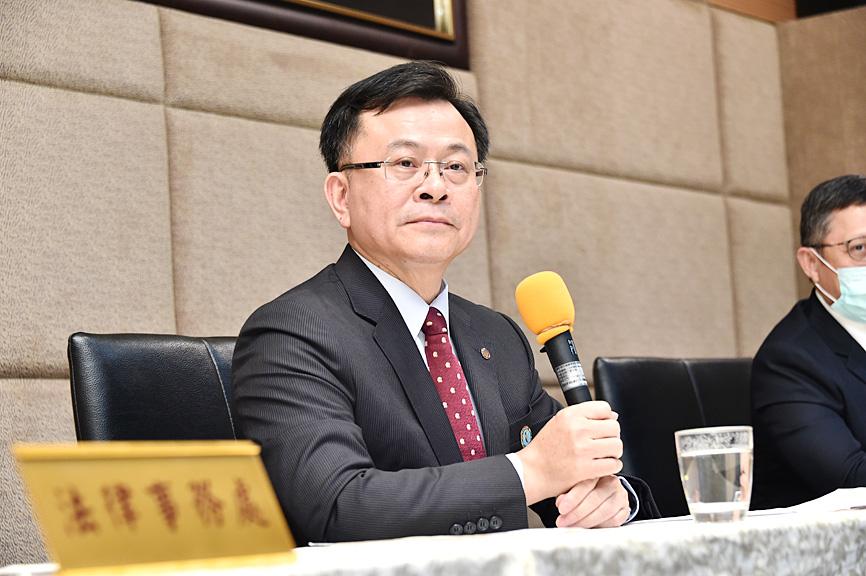National Communications Commission (NCC) commissioners yesterday reached a unanimous decision to reject CTi News’ (中天新聞台) license renewal application on the grounds that the channel’s frequent contraventions of media regulations showed that it has a malfunctioning internal control mechanism that cannot be rectified.
This was the first time since it was established in 2006 that the commission denied a license renewal to a news channel.
NCC Chairman Chen Yaw-shyang (陳耀祥) announced the landmark decision at the commission’s weekly media briefing.

Photo: Tu Chien-jung, Taipei Times
The commission denied the renewal request because the news channel was fined a total of NT$11.53 million (US$400,932) for 25 breaches of media regulations between 2014 and this year — significantly more than other news channels, Chen said.
Last year, the commission received 962 consumer complaints regarding the channel’s broadcasting content, which accounted for about 31 percent of all complaints received that year, he said.
Evidence the commission collected at an administrative hearing on Oct. 26, and a meeting between NCC commissioners and CTi News on Nov. 4 showed that the fundamental problem was that the channel’s largest shareholder, Want Want China Times Media Group (旺旺中時集團) founder Tsai Eng-ming (蔡衍明), had directly and indirectly intervened in the news production process.
The channel’s management said it did not have a full-time managing director in the news department for five months in 2018, and that the post was then assumed by Chiu Chia-yu (邱佳瑜), who was Tsai’s special assistant, Chen said, adding that during this time, the channel’s breaches increased.
During the news conference, Chen was bombarded with questions from reporters, particularly by CTi News journalists.
They asked whether the commission was concerned that its ruling would leave the nation with only one political voice.
“Taiwan has freedom of the press, and it has never been reduced to one voice after it became a real democratic country and entered the digital era,” Chen told them.
Asked if the commission is prepared to engage in a legal battle, Chen said that it respects CTi News’ right to seek redress through the judicial system, adding that it is confident that the review process would hold up to scrutiny.
Reporters Without Borders (RSF) yesterday extended sympathy to the employees of CTi News, but said that it does not believe the decision infringes on freedom of the press.
In a statement released after the NCC’s decision, RSF said freedom of the press does not mean an absence of oversight.
The group also supported the legitimacy of the NCC’s investigation, saying that a periodic licensure review by an independent agency is standard procedure in democracies.
It also called for the same standards to be applied to applications from media outlets of all political stripes.
The government must take responsibility for the nation’s past and current lack of journalistic ethics and editorial autonomy, the group added.
Reporters are working in an extremely polarized and profit-seeking environment, which affects the people’s right to complete and undistorted information, it said.
No matter what party is in power, RSF called on the government to ensure journalistic integrity.
Additional reporting by Kayleigh Madjar

SECURITY: As China is ‘reshaping’ Hong Kong’s population, Taiwan must raise the eligibility threshold for applications from Hong Kongers, Chiu Chui-cheng said When Hong Kong and Macau citizens apply for residency in Taiwan, it would be under a new category that includes a “national security observation period,” Mainland Affairs Council (MAC) Minister Chiu Chui-cheng (邱垂正) said yesterday. President William Lai (賴清德) on March 13 announced 17 strategies to counter China’s aggression toward Taiwan, including incorporating national security considerations into the review process for residency applications from Hong Kong and Macau citizens. The situation in Hong Kong is constantly changing, Chiu said to media yesterday on the sidelines of the Taipei Technology Run hosted by the Taipei Neihu Technology Park Development Association. With

CARROT AND STICK: While unrelenting in its military threats, China attracted nearly 40,000 Taiwanese to over 400 business events last year Nearly 40,000 Taiwanese last year joined industry events in China, such as conferences and trade fairs, supported by the Chinese government, a study showed yesterday, as Beijing ramps up a charm offensive toward Taipei alongside military pressure. China has long taken a carrot-and-stick approach to Taiwan, threatening it with the prospect of military action while reaching out to those it believes are amenable to Beijing’s point of view. Taiwanese security officials are wary of what they see as Beijing’s influence campaigns to sway public opinion after Taipei and Beijing gradually resumed travel links halted by the COVID-19 pandemic, but the scale of

A US Marine Corps regiment equipped with Naval Strike Missiles (NSM) is set to participate in the upcoming Balikatan 25 exercise in the Luzon Strait, marking the system’s first-ever deployment in the Philippines. US and Philippine officials have separately confirmed that the Navy Marine Expeditionary Ship Interdiction System (NMESIS) — the mobile launch platform for the Naval Strike Missile — would take part in the joint exercise. The missiles are being deployed to “a strategic first island chain chokepoint” in the waters between Taiwan proper and the Philippines, US-based Naval News reported. “The Luzon Strait and Bashi Channel represent a critical access

Pope Francis is be laid to rest on Saturday after lying in state for three days in St Peter’s Basilica, where the faithful are expected to flock to pay their respects to history’s first Latin American pontiff. The cardinals met yesterday in the Vatican’s synod hall to chart the next steps before a conclave begins to choose Francis’ successor, as condolences poured in from around the world. According to current norms, the conclave must begin between May 5 and 10. The cardinals set the funeral for Saturday at 10am in St Peter’s Square, to be celebrated by the dean of the College